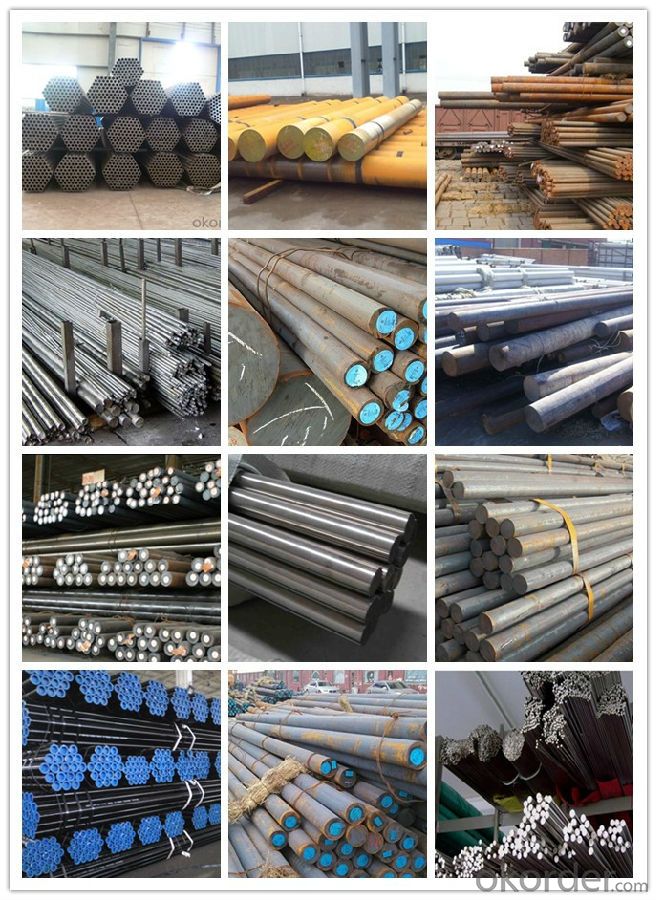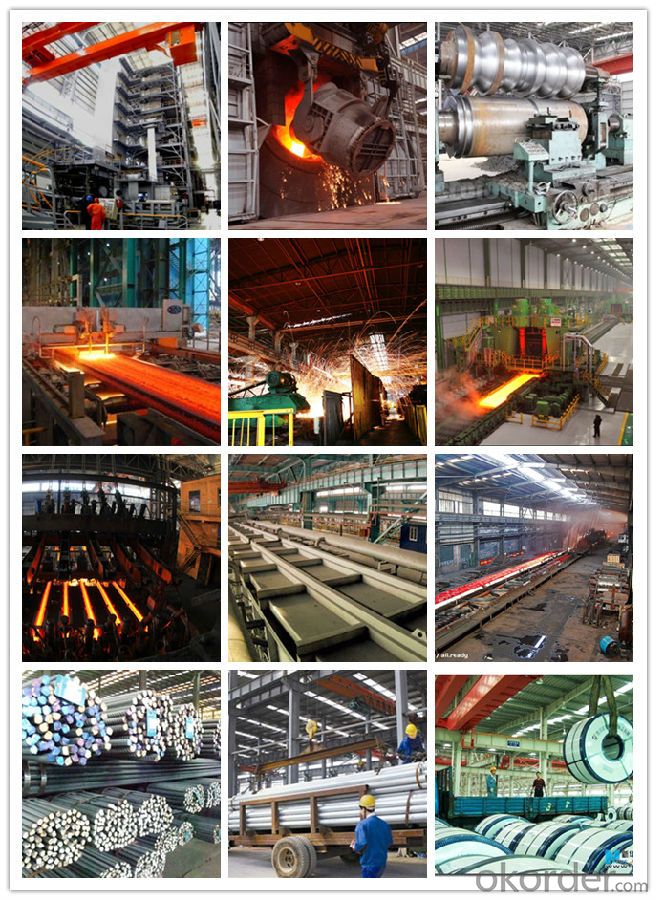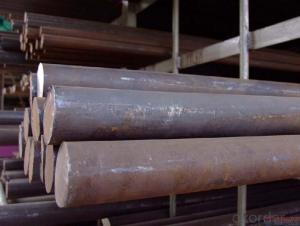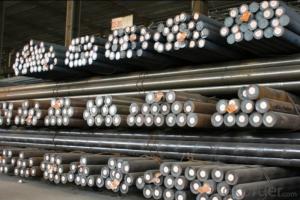Hot Rolled Carbon 25mm Thick Mild Steel Plate S45c
- Loading Port:
- China main port
- Payment Terms:
- TT OR LC
- Min Order Qty:
- 30 m.t.
- Supply Capability:
- 10000 m.t./month
OKorder Service Pledge
OKorder Financial Service
You Might Also Like
Item specifice
Hot Rolled Carbon 25mm Thick Mild Steel Plate S45c
Product information:
1,Grade: 50#(SAE1050,)
45#(SAE1045,1.1191,S45C)
2,Specification:25/30/35/40/45/50/55/60/65/70/75/80/90/105/115/125MM.cutted any size by customer request
Chemical composition: C=0.42-0.5,Si=0.17-0.37,Mn=0.5-0.8,P≤0.035,S≤0.035,Cr≤0.025,Ni≤0.025
3,Hardness:HBS=140-210
4,Application:Used for making the mould bottom, plastic mould and normal mechinery parts.
5,Payment terms:30%deposit,and balance against T/T or L/C at sight.
| 1.Specifications of ASTM Steel Plate | |||||||||
| Round bar | Diameter(mm) | Length (mm) | |||||||
| 20~800 | 3000~5800 | ||||||||
| Plate | Thickness(mm) | Width (mm) | Length (mm) | ||||||
| Max:800 | 1600~2300 | 3000~5800 | |||||||
| 2.Chemical compositon(%) | |||||||||
| Standard Number | C | Si | Mn | Cr | Ni | Cu | S | P | |
| GB | 45# | 0.42~0.50 | 0.17~0.37 | 0.5~0.8 | ≤0.25 | ≤0.3 | ≤0.25 | ≤0.035 | ≤0.035 |
| AISI | 1045 | 0.43~0.50 | 0.10~0.60 | 0.6~0.9 | ≤ 0.50 | ≤0.40 | |||
| DIN | 1.1191 | 0.42~0.48 | 0.15~0.35 | 0.6~0.9 | ≤0.15 | ≤0.2 | ≤0.3 | ||
| JIS | S45C | 0.42~0.50 | ≤0.40 | 0.5~0.8 | ≤0.40 | ≤ 0.4 | |||
| 3.Delivery condition and Heat treatment | |||||||||
| Forging | Normalization | Hardening | Subcritical annealing | Isothermal annealing | Tempering | ||||
| 1100~850* | 840~880 | 820~860 water | 650~700* | 820~860 600x1h* | 550~660 | ||||
| 4.Characteristic | |||||||||
| Nice machanical porpertys and worse hardenability,so, it is used for machine parts | |||||||||
| 5.Application of ASTM Steel Plate | |||||||||
| 1): Can be used in many fields such as building, automobile, shipbuilding, | |||||||||
| petrochemical, machinery, medicine, food, electric power, energy, space, building | |||||||||
| and decoration, etc. | |||||||||
| 2): Can be made into mould template, mortise pin, column. | |||||||||
| 3): This kind of steel have good mechanical property, is widely used in structural parts | |||||||||
| which may support stress alternation, especially made into some connecting | |||||||||
| rods, bolts, wheel gear... | |||||||||
| 4): This kind of steel is the most common blanks and materials of shaft part. | |||||||||
Product show

Workshop show

Our service:
-High manufacturing accuracy
-High strength
-Small inertia resistance
-Strong heat dissipation ability
-Good visual effect
-Reasonable price
Chose happens because of quality, then price, We can give you both.Additionally, we can also offer professional products inquiry, products knowledge train(for agents), smooth goods delivery, exellent customer solution proposals.Our service formula: good quality+good price+good service=customer's trust
SGS test is available, customer inspection before shipping is welcome, third party inspection is no problem.
If you need the sample, please feel free to let me know. Any question, we will contact you ASAP!
- Q:How does special steel contribute to the durability of products?
- There are several ways in which special steel enhances the durability of products. Initially, special steel's notable qualities of high strength and hardness make it resistant to wear and tear. As a result, products constructed from special steel can endure heavy usage and outlast those made from regular steel or alternative materials. Moreover, special steel commonly incorporates other elements like chromium, nickel, and molybdenum, which heighten its resistance to corrosion. This is particularly crucial for products exposed to harsh environments or chemicals. The corrosion resistance of special steel aids in preventing rust and deterioration, thus increasing the product's lifespan. Additionally, special steel can undergo heat treatment to enhance its mechanical properties, including toughness and hardness. Through specific heating and cooling processes, heat-treated special steel becomes stronger, rendering it less susceptible to deformation and breakage. This is especially advantageous for products subjected to heavy loads or impacts. Furthermore, special steel is often manufactured with precise composition and microstructure, resulting in improved material properties. This encompasses superior fatigue resistance, implying that the material can endure repeated stress without developing cracks or breaking. Consequently, products made from special steel exhibit enhanced reliability and are less prone to failure. In conclusion, special steel significantly contributes to product durability through its high strength, corrosion resistance, improved mechanical properties, and superior fatigue resistance. By incorporating special steel into the manufacturing process, products can be designed to withstand various demanding conditions, ensuring a longer lifespan and greater reliability.
- Q:What are the different methods for improving the toughness of tool steels used in special steel?
- Tool steels used in special steel applications can be toughened through various methods. The goal is to increase their resistance to fracture and ability to absorb energy without becoming brittle. Some techniques for improving the toughness of tool steels include: 1. Alloying: Adding specific alloying elements like chromium, molybdenum, vanadium, and tungsten significantly enhances the toughness. These elements form carbides within the steel matrix, improving toughness. 2. Heat treatment: Proper heat treatment greatly improves toughness. Quenching and tempering are commonly used processes. Quenching rapidly cools the steel, resulting in a hardened structure. Tempering involves reheating and slow cooling to relieve internal stresses and increase toughness. 3. Controlled cooling rates: Optimizing toughness is possible by controlling the cooling rate during heat treatment. Slow cooling allows for a more uniform microstructure, leading to improved toughness. 4. Grain refinement: Refining the grain size enhances toughness. This can be achieved through hot working, controlled rolling, or adding grain refining elements like titanium or zirconium. 5. Surface treatments: Shot peening or nitriding can improve toughness. Shot peening bombards the steel surface with small metal or ceramic particles, creating compressive residual stresses that enhance toughness. Nitriding diffuses nitrogen into the surface, forming a hard and wear-resistant layer. 6. Cryogenic treatment: Subjecting the tool steel to extremely low temperatures for an extended period refines the microstructure and reduces residual stresses, improving toughness. 7. Powder metallurgy: Techniques like hot isostatic pressing or sintering can produce tool steels with improved toughness. Fine powder, high pressure, and temperature result in a more uniform and fine-grained microstructure, increasing toughness. Ultimately, the specific methods selected and combined depend on the tool steel's requirements and intended application. By carefully considering these techniques, manufacturers can enhance the toughness of tool steels for demanding special steel applications.
- Q:How does special steel perform in high-temperature creep conditions?
- Special steel performs well in high-temperature creep conditions due to its high strength, excellent resistance to deformation, and superior heat resistance properties. It can withstand prolonged exposure to elevated temperatures without significant deformation or structural failure, making it an ideal choice for applications in industries such as aerospace, power generation, and petrochemicals.
- Q:What are the different corrosion protection methods used for special steel?
- To ensure the durability and longevity of special steel, various methods are employed for corrosion protection. These methods encompass: 1. Coatings: The application of diverse coatings, including paint, epoxy, or zinc, creates a protective layer on the steel surface. Such coatings function as barriers, preventing direct contact between moisture, corrosive elements, and the steel. 2. Galvanization: By coating the steel with a layer of zinc through the process of galvanization, a sacrificial barrier is formed wherein the zinc corrodes instead of the steel. Galvanized steel is commonly utilized in outdoor applications such as fences, poles, and roofing. 3. Stainless steel: Special steel can be manufactured using stainless steel, which contains a high percentage of chromium. The presence of chromium results in the formation of a passive layer on the steel's surface, endowing it with excellent corrosion resistance. Stainless steel finds wide usage in industries like construction, food processing, and medical equipment. 4. Cathodic protection: This method involves the creation of an electrical current or the utilization of sacrificial anodes to protect the steel. By introducing a more reactive metal (sacrificial anode) or applying an electrical current, corrosion is minimized as the reactive metal corrodes instead of the steel. 5. Alloying: Modifying the steel's composition by incorporating elements like nickel, molybdenum, or copper can enhance its resistance to corrosion. These alloying elements form a protective layer on the surface, rendering the steel more resistant to rust and other forms of corrosion. 6. Passivation: Passivation is a chemical process that eliminates free iron from the steel's surface, leading to the formation of a protective oxide layer. This layer acts as a barrier against corrosion, augmenting the steel's resistance to rust and other forms of corrosion. 7. Proper maintenance: Regular inspection, cleaning, and maintenance of special steel play a vital role in preventing corrosion. The removal of dirt, debris, and other contaminants from the steel's surface aids in preserving its protective coatings and averting corrosion. It is crucial to select the appropriate corrosion protection method based on the specific application and environmental conditions to ensure the long-term performance and durability of special steel.
- Q:What are the different methods of improving the corrosion resistance of special steel?
- Improving the corrosion resistance of special steel can be accomplished through several available methods. Some commonly utilized techniques include: 1. Alloying: Enhancing corrosion resistance can be effectively achieved by alloying the steel with specific elements. For instance, the addition of chromium forms a protective chromium oxide layer on the surface, acting as a barrier against corrosion. Other elements such as molybdenum, nickel, and copper can also be incorporated to enhance corrosion resistance. 2. Surface treatments: Various surface treatments can be employed to augment the steel's corrosion resistance. Galvanizing, for example, involves coating the steel with a layer of zinc, providing protection against corrosion. Another method, electroplating, deposits a thin layer of a more corrosion-resistant metal like nickel or chromium onto the steel surface. 3. Passivation: Passivation is a chemical process that eliminates free iron and other contaminants from the steel surface, resulting in the creation of a passive film that aids in corrosion resistance. This method is frequently used for stainless steel, in which a thin layer of chromium oxide is formed by treating the steel with an oxidizing agent such as nitric acid. 4. Protective coatings: The application of protective coatings on the steel surface significantly enhances its corrosion resistance. Various types of coatings, such as paints, epoxy coatings, and ceramic coatings, act as a barrier between the steel and the corrosive environment, preventing direct contact and corrosion. 5. Heat treatment: Heat treatment techniques, including annealing, quenching, and tempering, can alter the steel's microstructure, thereby enhancing its corrosion resistance. Heat treatment improves the steel's mechanical properties, reduces residual stresses, and eliminates impurities, all of which contribute to better corrosion resistance. 6. Design considerations: Proper design and construction techniques play a crucial role in improving the corrosion resistance of special steel. For instance, the elimination of sharp corners and crevices, the use of appropriate drainage systems, and ensuring proper ventilation can prevent the accumulation of moisture and corrosive agents. It is important to note that the selection of the most suitable method depends on the specific application, environment, and desired level of corrosion resistance. Optimal results can often be achieved by employing a combination of these methods.
- Q:What grade of iron powder should be used for processing special steel? Are there any other elements on the request? How much are they?
- Special steel into high quality carbon steel, alloy steel, high alloy steel (alloy element is greater than 10%) three categories, including alloy steel and high alloy steel special steel production accounted for 70%.
- Q:What are the advantages of using special steel in construction?
- There are several advantages of using special steel in construction. Firstly, special steel offers exceptional strength and durability, making it suitable for high-rise buildings, bridges, and other structures that require long-term stability. Additionally, special steel is resistant to corrosion, which enhances its lifespan and reduces maintenance costs. Furthermore, special steel can be fabricated into various shapes and sizes, allowing for flexible and efficient construction designs. Lastly, due to its recyclability, special steel is an environmentally friendly choice that promotes sustainability in the construction industry.
- Q:How does special steel contribute to the electronics industry?
- Special steel plays a crucial role in the electronics industry by providing key components and materials that are essential for the manufacturing and performance of electronic devices. It is used in the production of various electronic components including connectors, circuit boards, sensors, and power transmission components, due to its exceptional properties such as high strength, excellent corrosion resistance, and thermal conductivity. Special steel also enables the miniaturization and increased efficiency of electronic devices, enhancing their overall performance and durability.
- Q:What are the environmental impacts of manufacturing special steel?
- Manufacturing special steel has significant environmental impacts due to its energy-intensive production process and the extraction of raw materials. The production of special steel requires high temperatures and uses large amounts of fossil fuel-based energy, resulting in substantial greenhouse gas emissions contributing to climate change. Additionally, the extraction of iron ore and other raw materials for steel production can lead to deforestation, habitat destruction, and water pollution. The disposal of steel waste and byproducts also poses challenges, as it can contaminate soil and water sources. Therefore, the environmental impacts of manufacturing special steel must be carefully managed and mitigated through sustainable practices and technologies.
- Q:How is high-strength steel used in the automotive industry?
- High-strength steel is widely used in the automotive industry for its ability to enhance the safety and performance of vehicles. It is used in various components such as the frame, chassis, and body structure to improve structural integrity, reduce weight, and provide better crash protection. Additionally, high-strength steel allows automakers to design vehicles with improved fuel efficiency and increased load-carrying capacity, making it a crucial material in modern automotive manufacturing.
1. Manufacturer Overview |
|
|---|---|
| Location | |
| Year Established | |
| Annual Output Value | |
| Main Markets | |
| Company Certifications | |
2. Manufacturer Certificates |
|
|---|---|
| a) Certification Name | |
| Range | |
| Reference | |
| Validity Period | |
3. Manufacturer Capability |
|
|---|---|
| a)Trade Capacity | |
| Nearest Port | |
| Export Percentage | |
| No.of Employees in Trade Department | |
| Language Spoken: | |
| b)Factory Information | |
| Factory Size: | |
| No. of Production Lines | |
| Contract Manufacturing | |
| Product Price Range | |
Send your message to us
Hot Rolled Carbon 25mm Thick Mild Steel Plate S45c
- Loading Port:
- China main port
- Payment Terms:
- TT OR LC
- Min Order Qty:
- 30 m.t.
- Supply Capability:
- 10000 m.t./month
OKorder Service Pledge
OKorder Financial Service
Similar products
New products
Hot products
Hot Searches
Related keywords






























